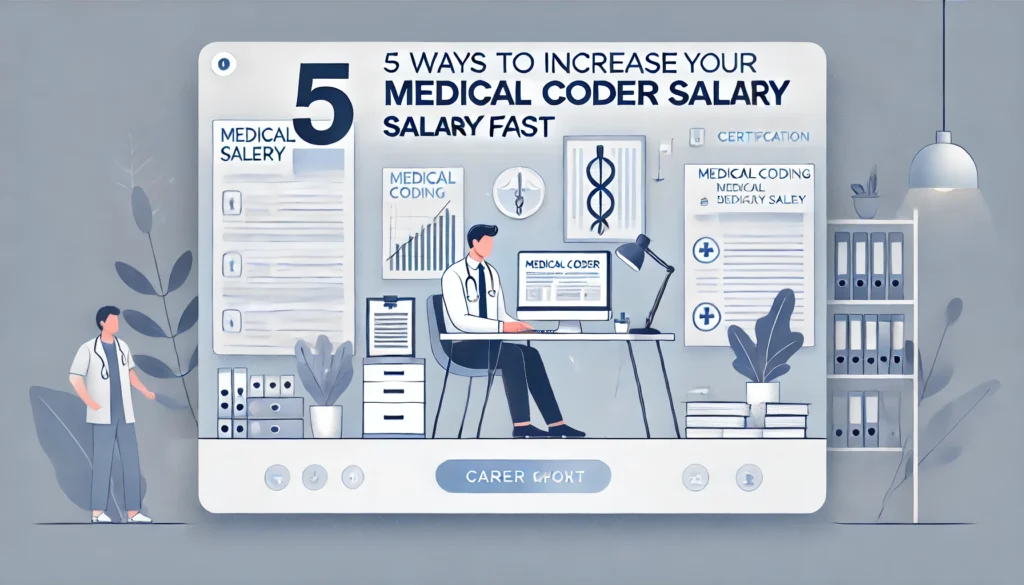Are you ready to increase your medical coder salary and unlock new earning opportunities in 2025? The demand for skilled medical coders is growing rapidly, driven by the increasing need for accurate healthcare documentation, billing, and compliance. With this rise, many professionals seek ways to maximize their earning potential. In 2025, medical coders will have several opportunities to increase their salaries quickly through certifications, specialization, and career shifts. This article explores five actionable strategies to help medical coders boost their income.

1. Obtain Specialized Certifications
One of the fastest ways to increase your salary as a medical coder is by obtaining specialized certifications. While entry-level certifications like the Certified Professional Coder (CPC) or Certified Coding Specialist (CCS) are essential, advanced certifications can significantly enhance your earning potential. Specialized credentials make you stand out in niche areas such as risk adjustment, auditing, or inpatient coding.
For those interested in enhancing their qualifications, the American Academy of Professional Coders (AAPC) offers a wide range of certifications specifically designed for medical coders.
Key Certifications to Consider:
- Certified Inpatient Coder (CIC): Specializes in coding for hospitals and inpatient care.
- Certified Risk Adjustment Coder (CRC): Focuses on coding for chronic conditions and risk-adjusted payments.
- Certified Outpatient Coder (COC): Ideal for outpatient and physician-based coding roles.
Depending on the demand in your region and field, specialized certifications can add up to 20% more to your base salary.
Tip:
Research the highest-demand specializations in your area or consider remote opportunities. Certifications in rare specializations are often rewarded with higher pay.

2. Leverage Remote or Flexible Work Opportunities
With the healthcare industry rapidly adopting remote work practices, medical coders can take advantage of flexible, work-from-home positions. Remote coders often have the opportunity to work with multiple employers, increasing their earning potential by taking on freelance or part-time contracts in addition to full-time employment.
Remote work also opens up possibilities to negotiate higher salaries, particularly for coders working with companies in high-cost-of-living areas, even if they reside in more affordable regions.
Benefits of Remote Work:
- Flexibility: Manage your own hours while balancing multiple contracts.
- Higher Pay: Coders working remotely for companies in high-demand regions can often negotiate better rates.
- Work-Life Balance: Reduce commuting time and stress by working from home.
Tip:
Seek out companies that offer competitive pay for remote medical coders, especially those in areas with high demand for healthcare services. Use online platforms and job boards to find part-time, contract-based, or full-time remote positions.
3. Negotiate for a Raise
Many medical coders underestimate the power of negotiation when it comes to salary. If you have certifications, experience, or specialized skills, use these as leverage during annual reviews or when starting a new job. Salary negotiation can lead to significant increases, especially in a field where demand often outpaces supply.
Steps to Successful Negotiation:
- Research Salary Ranges: Before entering a negotiation, research the typical salary range for medical coders based on your qualifications and experience level. Tools like the AAPC Salary Survey or PayScale can provide insights.
- Highlight Your Certifications: Emphasize any additional certifications and their relevance to your current role.
- Present Performance Data: If you’re already employed, showcase how your coding accuracy and efficiency have positively impacted revenue or compliance at your workplace.
Tip:
Don’t wait for annual reviews to initiate a salary discussion. If you’ve acquired new certifications or taken on additional responsibilities, request a meeting with your supervisor to discuss an adjustment to your salary.
Looking to increase your earning potential in healthcare? Discover comprehensive salary negotiation strategies tailored to healthcare professionals.

4. Pursue Continuing Education and Upskilling
In the fast-evolving healthcare industry, staying updated with the latest coding standards, technologies, and billing practices can set you apart from your peers. Many healthcare organizations value coders who pursue continuing education and regularly update their skills. By staying current, you’ll be more attractive to employers prioritizing accuracy, compliance, and efficiency.
Key Areas to Focus On:
- Coding Software Proficiency: Learn to use advanced coding software tools and electronic health records (EHR) systems.
- ICD-11 and Beyond: Stay ahead of the curve by mastering the upcoming changes in coding standards.
- Health Information Technology (HIT): Understanding healthcare IT systems can open doors to higher-paying jobs.
Tip:
Invest in continuing education courses offered by the American Academy of Professional Coders (AAPC) or other reputable organizations. Many employers will reimburse you for these courses, and they can lead directly to higher-paying roles.
5. Consider Moving Into a Leadership Role or Becoming a Coding Auditor
Medical coders can also increase earning potential by transitioning into leadership roles or becoming auditors. Coding supervisors, auditors, and managers are in high demand as healthcare organizations seek professionals who can ensure compliance with government regulations and oversee teams of coders.
Benefits of Leadership and Auditing Roles:
- Higher Salaries: Supervisory and auditing roles typically come with a significant pay bump compared to coding roles.
- Professional Growth: These positions often involve training others, reviewing coding accuracy, and ensuring regulatory compliance, offering a chance for career advancement.
- Stability: Leadership roles offer more job security, as healthcare organizations always need strong management and compliance officers.
Tip:
If you’re considering a leadership role, start by building your management skills and pursuing certifications like the Certified Professional Medical Auditor (CPMA). This can make your transition smoother and help you secure a higher-paying position.

Conclusion: Increase Medical Coder Salary in 2025
Increasing your medical coder salary in 2025 is achievable with the right strategies. You can significantly enhance your earning potential by obtaining specialized certifications, exploring remote work opportunities, negotiating effectively, continuing education, and considering leadership roles. The key is to stay proactive in your career development, remain adaptable to industry changes, and take advantage of opportunities to upskill.
Following these five steps, you can secure a more rewarding and financially lucrative career as a medical coder.
To explore more tips and insights on how to maximize your medical coder salary, visit this comprehensive guide.
FAQ Section
1. What certifications can help increase my medical coder salary?
Specialized certifications, such as Certified Inpatient Coder (CIC), Certified Risk Adjustment Coder (CRC), and Certified Outpatient Coder (COC), can enhance your qualifications and make you stand out in niche areas, potentially increasing your salary by up to 20%.
2. How does remote work impact my salary as a medical coder?
Remote work can allow you to work with employers in high-cost-of-living areas, even if you live elsewhere, enabling you to negotiate higher pay. It also offers flexibility to take on freelance or part-time roles in addition to full-time employment.
3. When is the best time to negotiate a raise as a medical coder?
The best time to negotiate is after achieving new certifications, gaining experience, or taking on additional responsibilities. You don’t need to wait for an annual review—request a salary discussion when you have a strong case for a raise.
4. How important is continuing education for medical coders?
Continuing education is crucial in the fast-changing healthcare industry. Staying updated with coding standards and health information technology can make you more competitive and open doors to higher-paying roles.
5. What roles can I pursue to increase my earning potential in medical coding?
Moving into leadership roles, such as coding supervisor, auditor, or manager, can significantly increase your salary. These roles offer professional growth and job security, often with higher compensation.







